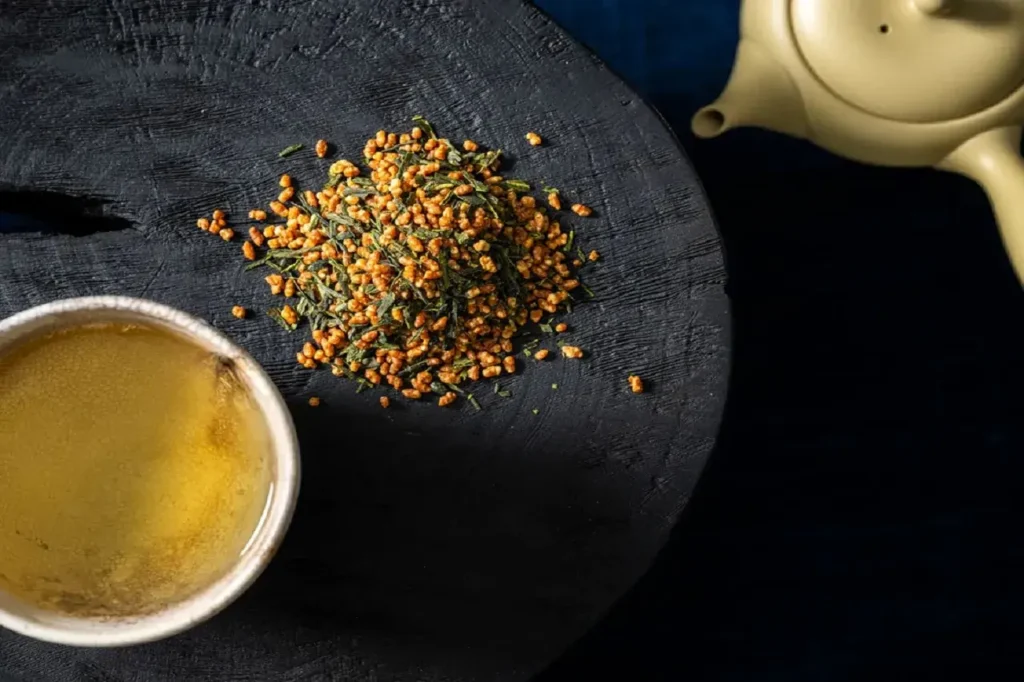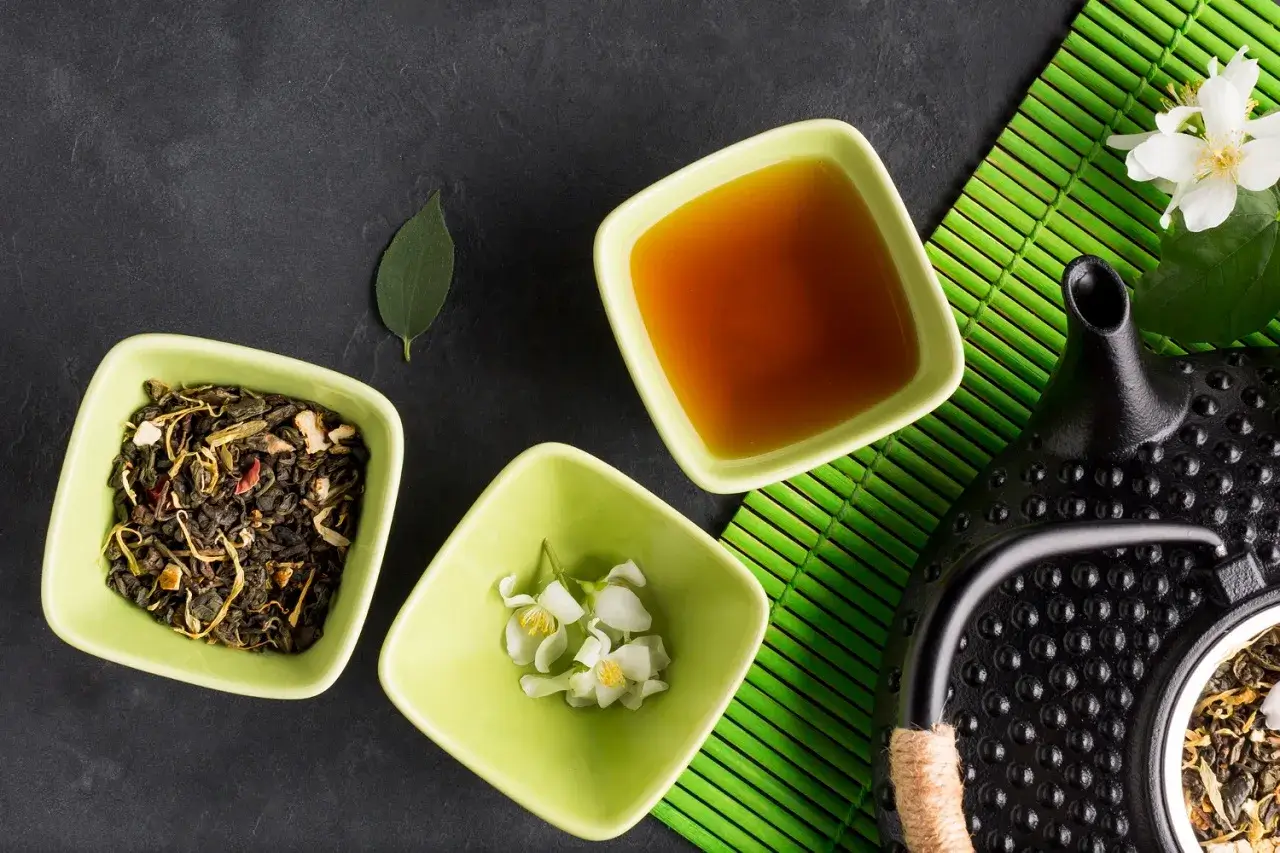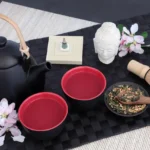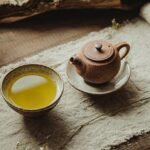Table of Contents
Introduction: Why Genmai Tea Deserves a Spot in Your Daily Routine
Incorporating Genmai tea into your daily routine is a decision that promises both delightful taste and numerous health benefits. Known for its unique blend of green tea and roasted brown rice, Genmaicha offers a flavor profile unlike any other. This distinct combination results in a nutty, aromatic brew that is as soothing as it is refreshing.
One of the primary reasons to drink Genmai tea lies in its impressive health benefits. Rich in antioxidants, this tea helps combat oxidative stress and supports overall well-being. It is also known to aid digestion and promote relaxation, making it an ideal choice for winding down after a long day.
Introducing Genmaicha into your routine not only enriches your palate with its unique flavors but also contributes positively to your health. Whether you’re seeking a moment of tranquility or an invigorating start to your day, Genmai tea deserves its place in your daily ritual. Embrace this exceptional beverage and experience the harmonious blend of taste and wellness it brings.
The Origins and History of Genmai-Cha: From Ancient Japan to Modern Tables
Genmai-Cha, often referred to as “Japanese green tea with roasted rice,” is more than just a delightful beverage; it is a testament to the rich tapestry of Japanese culture and tradition. The origins of genmaicha date back to ancient Japan, where resourcefulness and ingenuity led to the creation of this unique blend. Traditionally, genmaicha was crafted by combining green tea leaves with roasted brown rice, an innovation that not only stretched limited tea supplies but also added a distinctive nutty flavor and aroma.
The history of genmaicha is intertwined with the lives of common folk in Japan who sought affordable ways to enjoy their beloved teas. By incorporating roasted rice into their green tea, they created a satisfying brew that was both economical and flavorful. Over time, this practice gained popularity across different social strata and became one of the treasured traditional Japanese teas we know today.
In modern times, genmaicha has transcended its humble beginnings to become a staple on tables around the world. Its unique taste profile—combining the vegetal notes of green tea with the warm, toasted essence of rice—continues to captivate tea enthusiasts everywhere. As we sip on this storied beverage today, we are reminded not only of its deliciousness but also its enduring legacy as a symbol of creativity and cultural heritage in Japanese history.
👉 Taste the Toasted Goodness – Try Premium Genmaicha Tea! 👈
The Unique Flavor Profile of Genmai Tea: A Delightful Blend of Nutty and Fresh Tastes
When diving into the fascinating world of tea, few varieties captivate the palate quite like Genmaicha, often referred to as Genmai Tea. This remarkable blend showcases a harmony of tasting notes Genmaicha enthusiasts adore—earthy green tea paired with the rich, toasty flavor of roasted brown rice. The result is a beverage that offers both soothing warmth and a refreshing complexity, making it truly one of a kind.
The genmaicha flavor description often highlights its distinctive balance between the grassy freshness of green tea and the savory richness imparted by toasted rice. This fusion results in a nutty green tea that captivates your senses with every sip. The tasting notes for genmaicha reveal layers of complexity: a hint of sweetness from the rice intermingles with vegetal tones from the tea leaves, leaving behind a smooth and satisfying finish.

The flavor profile of genmai tea is not only appealing but also versatile. It pairs beautifully with meals or can be enjoyed on its own, making it an ideal choice for those seeking something different yet accessible. Whether you’re a seasoned tea enthusiast or new to exploring diverse brews, Genmai Tea invites you to savor its harmonious blend—a true testament to the artful craftsmanship behind this exceptional infusion.
Health Benefits That Make Genmai Tea a Powerhouse Beverage Choice
When it comes to choosing a beverage that combines taste with health benefits, genmaicha, or green tea with roasted brown rice, stands out as a powerhouse choice. This unique blend offers an array of health advantages that make it a must-have in your daily routine.
First and foremost, the antioxidants in genmaicha are a key benefit. The green tea component is rich in catechins, which are known to combat free radicals and reduce oxidative stress. This not only supports overall health but also aids in reducing the risk of chronic diseases.
Moreover, if you’re looking to improve digestion naturally, genmaicha can be an excellent ally. The roasted rice adds fiber and nutrients that help regulate digestive processes and promote gut health. Incorporating this tea into your diet can lead to smoother digestion and better nutrient absorption.
For those who are sensitive to caffeine but still want the benefits of green tea, genmaicha is an ideal choice due to its low caffeine content. You can enjoy multiple cups throughout the day without experiencing the jitters associated with higher-caffeine teas or coffee.
Incorporating genmaicha into your lifestyle not only provides these remarkable health benefits but also delivers a soothing experience with its nutty flavor profile. Embrace this powerhouse beverage for both its delightful taste and its comprehensive wellness advantages.
👉 Green Tea Meets Roasted Rice – Sip the Unique Blend! 👈
How to Brew the Perfect Cup of Genmai-Cha Roasted Rice Tea for an Authentic Experience
Brewing the perfect cup of Genmai tea at home is not just about following a recipe; it’s about embracing an authentic experience that transports you to the heart of Japanese tea culture. To truly savor this unique blend, understanding the right brewing techniques for Genmai tea is essential.
Start by selecting high-quality Genmaicha, which typically combines green tea leaves with roasted brown rice. This delightful combination offers a nutty aroma and a smooth, refreshing taste. Begin your journey by using fresh, filtered water and heating it to just below boiling—around 175°F (80°C). This temperature is crucial as it ensures that the delicate flavors of green tea are not overshadowed by bitterness.
For the best flavor, put one tablespoon of Genmaicha into your teapot or infuser. Carefully pour hot water over the leaves and steep for two minutes. This method highlights the tea’s fresh grassy taste while complementing it with the nutty aroma of roasted rice.
Once steeped, pour your Genmai tea into a cup and take a moment to appreciate its golden hue and inviting fragrance. Each sip should offer a harmonious blend that feels both comforting and invigorating—a true testament to mastering how to make Genmaicha at home.

By following these simple yet effective steps, you can enjoy an authentic experience with every brew, making each cup of Genmai chai not just a drink but an indulgent ritual worth cherishing.
Where to Find the Best Quality Genmai Tea Online and In Stores
If you’re on a quest to find the best quality Genmai tea, also known as Genmaicha, you’re in for a delightful journey. Known for its unique blend of green tea and roasted brown rice, this Japanese classic offers a nutty flavor that is both comforting and invigorating. But where can you find the finest selections? Let’s explore your options.
When it comes to buying Genmai tea online, several reputable retailers offer an impressive array of choices. A comprehensive buying guide for the best Genmaicha brands can be invaluable in navigating these options. Websites like Yunomi and Hibiki-An specialize in authentic Japanese teas and provide detailed descriptions of their offerings, ensuring you know exactly what you’re getting. These platforms often include customer reviews and ratings, helping you make an informed decision.
For those who prefer the tactile experience of shopping in person, there are top stores dedicated to unique teas that carry high-quality Genmaicha. Specialty tea shops such as Teavana or smaller local boutiques often stock premium Japanese teas sourced directly from Japan. Visiting these stores allows you to engage with knowledgeable staff who can offer personalized recommendations based on your taste preferences.
Whether online or in-store, finding quality Japanese teas requires some research but is well worth the effort for tea enthusiasts eager to savor the rich flavors of genuine Genmai tea.
👉 Discover Japan’s Best-Kept Tea Secret – Genmaicha Awaits! 👈
Conclusion: Embrace the Rich Taste and Benefits of Genmai Tea Today!
In conclusion, embracing Genmai tea is not just about indulging in its unique and rich taste; it’s about welcoming a host of benefits into your daily routine. This delightful blend of green tea and roasted brown rice offers a soothing experience that caters to both the palate and the body. With its nutty flavor profile, Genmai tea stands out as a comforting beverage that can be enjoyed at any time of day.
Moreover, the health advantages are compelling. Packed with antioxidants, Genmai tea supports immune function and promotes overall well-being. Its lower caffeine content compared to traditional green teas makes it an ideal choice for those seeking relaxation without sacrificing alertness.
By incorporating Genmai tea into your lifestyle, you’re choosing a path of mindfulness and wellness. Whether you’re savoring it during a quiet moment alone or sharing it with friends, this remarkable tea enriches every occasion. So why wait? Embrace the rich taste and numerous benefits of Genmai tea today—your body and mind will thank you!













